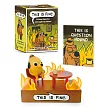Many people in Western cultures are uncomfortable using the words: dead, death, or dying. Instead, the event is described using euphuisms: passing over, passed away, transitioned to the other side, even gone to sleep and won't wake up. Children, who may have seen bugs die, or dead birds, or may have even buried a pet, really have no frame of reference for "passing away." Children need to be given information about the death, in a caring and calm manner, according to their age and understanding. Each child will then be able to absorb the reality and begin greiving and processing facts and feelings in his or her own way . The loss of a beloved pet may be the first death experience children face. It is very traumatic for the child and should not be trivialized. Their feelings and emotions are very real and they are trying to process the situation as best they can. They need the support and understanding of caring adults to work through what has happened and what it means to them personally. Pet loss can be a catalyst for growth and understanding for the whole family.



 天天爆殺
天天爆殺  今日66折
今日66折 
























 博客來
博客來 博客來
博客來 博客來
博客來 博客來
博客來 博客來
博客來